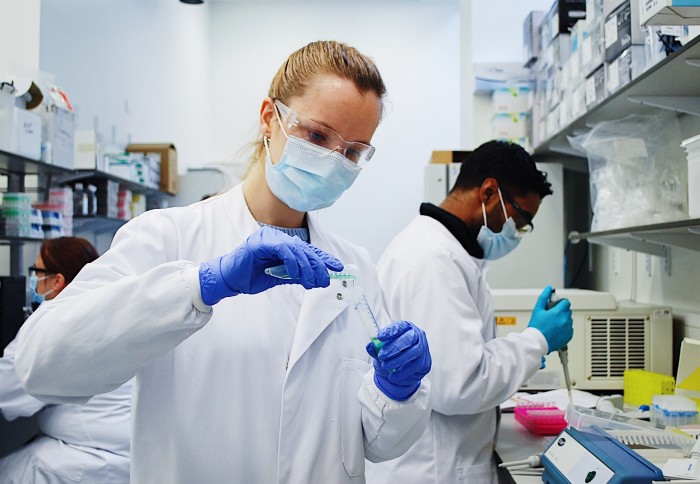Life sciences startup moves to dedicated Incubator lab to focus on COVID-19

Having pivoted their technology to treat hyperinflammation in COVID-19, the MediSieve team has moved into their own space at the White City Incubator.
Technology developed by MediSieve, a biotech company based in Imperial's White City Incubator, uses magnetic beads to remove targeted pathogens directly from the patient’s bloodstream. Its platform has the potential to treat a range of blood-borne diseases such as malaria, sepsis and leukaemia, but the onset of the pandemic brought a new focus for the company. Seeing the potential for their technology to help treat the impact of the cytokine storm often experienced during a severe COVID-19 infection, the company pivoted to a programme to remove the cytokine IL-6 from the blood.
Seeing the potential for their technology to help treat the impact of the cytokine storm often experienced during a severe COVID-19 infection, the company pivoted to a programme to remove the cytokine IL-6 from the blood.
Cytokines are small signalling molecules naturally present in the body. However, during severe infections, inflammatory cytokines can be released in large-scale as a result of an overreaction of the immune system. This can lead to cell and organ damage, and eventually death. Unlike other methods, MediSieve's approach to this reaction is to selectively remove the “bad” cytokines such as IL-6 while leaving the good cytokines and other proteins in the bloodstream.
The team worked continuously in their shared lab throughout the pandemic and were able to use space in the Incubator flexibly when needed. With the new COVID-19 programme firmly at the centre of their work they have now decided to move into their own lab to accelerate the safety studies and move towards the first in-human trials of this application.

A tangible progression
“We are very happy to be in our own lab space,” says Dr Cristina Blanco-Andujar, Chief Technology Officer of MediSieve. “It has improved our workflow hugely as we now have dedicated areas for different activities so everything can be very controlled. In addition, this new space represents our development over the last year and makes our progression feel really tangible. The team is very excited about the future.”
Currently every member of the MediSieve team is working towards the goal of finishing the submission for the first in-human trials of their IL-6-driven hyperinflammation programme later this year. In the long-term and once the product is on the market, the plan is to work towards a ‘Sepsis cocktail’ which uses a mix of magnetic beads to target different aspects of the sepsis such as the cytokine IL-1b and fragments of bacteria produced after antibiotic treatment.
“We are doing something very new,” says Dr Blanco-Andujar. “And it’s important for us to bring this product into human use so it can pave the way for other products using the platform. From a regulatory standpoint it makes a huge difference to get that first product into the market. Firstly it can shape how we approach our next submissions, but it can also shape how regulators will see our future products.”

A community of like-minded companies
The Incubator’s flexibility and its ability to let companies grow into the space they need was very influential in MediSieve’s original decision to base themselves at White City in 2018. These qualities have continued to be central in their choice to remain at the Incubator, alongside the benefit of being based within the Imperial enterprise ecosystem and its community.
The Incubator team are always proactive in getting insight from the residents in order to shape what they offer to us in terms of support. Dr Cristina Blanco-Andujar CTO, MediSieve
“If we have problems with our equipment we can reach out to other companies,” says Dr Blanco-Andujar. “If we come across a problem or need training we can ask the Incubator team and they can connect us with someone who can help. The team here are always proactive in getting insight from the residents in order to shape what they offer to us in terms of support. It’s this aspect of the Incubator that creates the added value of the space so it’s not ‘just a lab’.”
As a platform technology MediSieve are planning to continue work on products for other blood-borne diseases once the IL-6-driven hyperinflammation programme is into clinical trials. With the challenges and potential that come with working on several product pipelines at different stages they are looking forward to maximising the use of their own working space and expanding the team further in the near future.
“MediSieve are a fantastic example of the type of company that both brings and receives value from being based at the Incubator,” said Richelle McNae, Entrepreneurial Programmes Coordinator at Imperial. “Leveraging a community of like-minded companies means founders can learn from each other, share equipment and reach their growth potential sooner.”
Article text (excluding photos or graphics) © Imperial College London.
Photos and graphics subject to third party copyright used with permission or © Imperial College London.
Reporter
Franca Davenport
Communications and Public Affairs